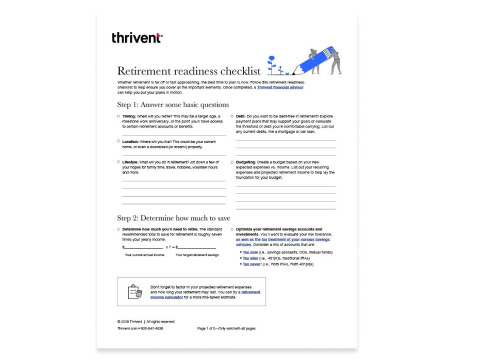You can see retirement. It's so close, and you're ready to enjoy your next phase of life. Now, you need to craft a plan—one that plots out how to retire in the next five years with the income you need for the life you envision.
To craft that plan, it's time to think about your retirement income needs and investments side by side. Each informs the other, and by considering both, you can build a strategy to shore up your savings and arrange your finances so you can start your retirement with confidence.
Here are the steps to take when you're thinking about wrapping up your working life and considering how to retire in five years.
Step 1: Are you ready to retire in five years?
The first step is asking:
You can find your intentions by digging in with some thoughtful questions. Consider your community at work and how you'll find community without it. If you have a spouse or partner, talk with them about the time you'll spend together and apart, including what you envision as an ideal retirement. Weigh whether you're ready to fully step away from work or if shifting to a part-time job or pursuing a late-breaking career is what you need to feel secure. Assess your current health as well as your anticipated life expectancy.
There are
Step 2: Tally your retirement income sources
When you step away from full-time employment during retirement, you'll still have several ways to generate income. It's important as a pre-retiree to take stock of what you have saved and your ongoing
Retirement savings , including accounts like IRAs and 401(k)s- Outside investments, like
stocks, mutual funds, ETFs and bonds Social Security benefits Annuities Pensions - Part-time jobs
- Additional income-generating assets like rental property or a business
Once you take stock of your current and potential avenues for income, it's time to run the numbers. You can plug those account balances and estimates into a
Generally speaking, you should aim to have roughly eight to 10 times your current annual salary
For instance, say you have a
Step 3: Plan out your retirement budget
Beyond inflation and income planning, your five-year retirement outlook should form around the retired life you envision. Consider budget adjustments, the home you live in, and those you love as you build a comprehensive retirement plan that provides for both.
Building the ideal retirement budget
Your dream retirement begins with a closer look at today's budget and how it will change in the years to come. Projecting your new income and expenses is important because you'll be
A
- Day-to-day expenses. Do you expect them to stay the same or decrease? Consider line items like gas, tolls, parking and auto insurance that might change when your daily commute is no longer a factor.
- Housing expenses. How will retirement impact your monthly housing budget? Running the numbers can help you see what it would look like to pay off your mortgage or downsize.
- Current debt. Will you carry debt beyond a mortgage into retirement? Calculating any current debt and its average interest rate can help you compare budget-saving options like debt consolidation loans or
early debt payoff to increase your spending power when you switch to a fixed income. Usingdebt payoff strategies like the debt avalanche or snowball methods could be useful. - Health expenses. What costs do you have now and what new costs might you face down the road? Retiring usually means ending your employer-sponsored plan and getting your own
health insurance in retirement. But most people aren't eligible for Medicare until age 65. Also consider thataging is often tied to higher medical expenses, and you may find that you eventuallyneed long-term care.
When calculating your retirement income needs, it's wise to add in a cushion so you're covered in case of future changes,
Try running calculations that add interest to your estimated retirement income and spending needs. You'll always be the best judge of what you need in the bank to feel confident about life's curveballs. Once you have a number, you can work with an advisor to adjust your current savings strategy and future income plan.
By reviewing your budget in the five years leading to retirement, you can craft a strategy that balances your life, values and priorities with your projected retirement income.



Step 4: Identify risks to your retirement savings and how to mitigate them
As you plan how to retire in the next five years, look at the greatest risks to your life savings and
Outliving your money
A long and healthy life is a blessing. But it's natural to worry that you'll
An experienced financial advisor can help you create a retirement income plan that uses all of your current and future income resources to their utmost advantage. With expert help, you can decide
A financial advisor also can help you stretch your savings through
Market volatility
A five-year retirement plan—or any financial strategy—has to factor in market volatility. Because markets rise and fall, it's important to look at your current investments and determine what changes need to be made to protect your savings as you plan to exit the workforce.
Today, you may hold a large amount of higher-volatility investments in your retirement portfolio. This includes stocks or stock-heavy mutual funds and ETFs. During the peak of your working years, you can afford to take risks to grow your wealth because you have time to recover from inevitable market dips.
As you near retirement, though, you don't have time to recoup losses. That's why, during the five years heading into retirement, it's important to work with an advisor to gradually reallocate your investments. By shifting some of your holdings to lower-volatility assets like bonds, certificates of deposit or balanced ETFs and mutual funds, you can protect your wealth and future income while still enjoying modest growth.
At any stage in life, it's important for your retirement investment strategy to align with your risk tolerance. Working with an advisor can help ensure your investments bring you peace of mind instead of keeping you up at night.
Loss of value due to inflation
Rising prices from inflation can impact your future spending power, which can be especially worrying if you live on a fixed income. An advisor can help you choose investments that protect your savings and future purchasing power.
Advisors are particularly adept at helping clients safeguard their retirement savings from
Changing tax laws
New legislation frequently affects how much Americans pay on Tax Day. While some updated rules can benefit retirees, others create additional burdens. It's hard to predict future tax-related developments, so it's important to make some proactive plans to safeguard your savings in case taxes increase down the line.
To prevent
For instance, if you have significant savings in a
Health challenges & expenses
The average couple will spend about $300,000 on health care during retirement. As you're closing in on the years before retirement, consider how you'll pay for care—both on a day-to-day basis and in the event you or a loved one requires a higher level of care.
First, read up on the differences between traditional Medicare and Medicare Advantage plans. Once you're eligible to sign up, the plan you choose will dictate where and how you seek care, including the providers you can use and how much you'll pay for premiums.
Next, think about how you'll pay for higher levels of care if you face significant health challenges. A
Step 5: Keep contributing to your retirement accounts
No matter how close you are to retirement, continuing to put money in your retirement accounts is crucial. People aged 50 and older even have special incentives to do so since accounts like IRAs and 401(k) have
As of 2024, those who are 50+ can contribute an extra $7,500 annually to a 401(k) plan for a total annual contribution of $30,500. Age-eligible IRA holders can contribute an additional $1,000 annually, for a total of $8,000.
Starting in 2025, older investors will get additional boosts. Thanks to the
Whether you're short on your savings goals or just want a bit more in the bank before retirement, these extra contributions can help quickly increase your nest egg.

Step 6: Diversify with taxes in mind
Taxes can eat away at your retirement savings, so it's important to think about
If you're concerned about taxes reducing your retirement income, a
You'll pay taxes on the amount you convert but won't be taxed again when you make
Roth IRAs have another benefit as well: They don't have
However, you might have some control over the timing and amount of your withdrawals, and the strategies around RMDs are worth discussing with a tax professional or financial advisor.
Craft your unique strategy for retirement
As you head into the last years before your retirement, you don't have to go it alone. Reach out to a







